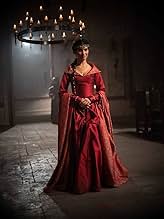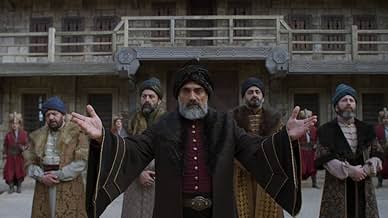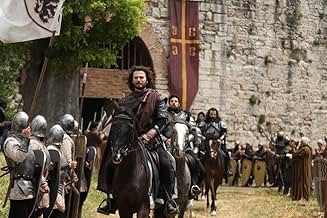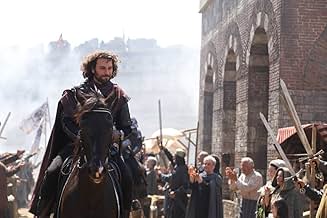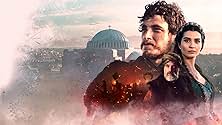O sultão otomano Maomé II trava uma campanha épica para tomar a capital bizantina de Constantinopla e moldar o curso da história, por séculos.O sultão otomano Maomé II trava uma campanha épica para tomar a capital bizantina de Constantinopla e moldar o curso da história, por séculos.O sultão otomano Maomé II trava uma campanha épica para tomar a capital bizantina de Constantinopla e moldar o curso da história, por séculos.
- Prêmios
- 1 vitória e 11 indicações no total
Explorar episódios
Avaliações em destaque
Text: I removed my first comment because I hadn't watched season 2 when I wrote it. I am coming back since I have just finished it. First of all the 2 seasons differ concerning inaccuracies. The 1st one relies more on history apart from the fact that they avoid to mention that Constantinos Paleologos was Greek,as many of the greatest emperors in eastern Roman Empire,and they paid too much attention to Justiniani. Ok the latter might have been a very good fighter but he left the battlefield while Paleologos fought till death as a man of honor and a real hero. So HE was the legend and the soul not Justiniani. However many other facts are decent and correct. Mehmed was really smart educated and wanted to be a Ceasar not just a sultan. His mother Huma Hatun was not Turkish that is why they didn't mention her origin,she was probably from Greece or Serbia. Historians say that is why Mehmed was different from other sultans and much more educated Or maybe helped him his adoptive mother Mara who was from a noble family half Serbian(from her father)half Greek(from her mother). Mara was really qualified and built many churches too so the environment Mehmed grew up was civilized concerning religions and different cultures.
Constantinopolis was really difficult to be conquered that IS true but at that specific time the City was weak and the emperor abandoned and betrayed by his allies So I think all these things are present in season 1 one way or another But season 2??What happened ?? Vlad was NOT the invader he was a hostage while all his childhood so he did what he should do! He wanted freedom! And he was cruel but not against his own people I have never found any official source about something like this! He was cruel against the invaders that's normal not??
Moreover the direction tries to present that hostages live happily with ottomans. Yes ok sometimes this had happened but have you ever thought that they did not have any other option??they just try to survive this is not friendship! Vlad was much more than what season 2 presents! Don't forget that many people suffer from the taxes to ottomans they wanted independence and they had suffered a lot. Ottomans weren't educated as Mehmed,he was an exception. That is why Balcans remained so underdeveloped and we are still trying to overcome all this cultural damage!
Last but not least they mention Alexander the Great many times since Mehmed admired him as many others Caesars did and Napoleon some centuries after,but one more time without telling that he was Greek!!
We are still speaking the language he and his teacher Aristotle spoke,of course in a modern and simplified version,but nobody mentions his origin as in other Tv series! That is a little bit stupid I think Fortunately acting and battle scenes are really good I liked the actors for Mehmed,Vlad and Mehmed as a child I have seen this boy in another Turkish série he is talented!
So give it a try I think it is worth but in some points you will feel dissatisfied.
Constantinopolis was really difficult to be conquered that IS true but at that specific time the City was weak and the emperor abandoned and betrayed by his allies So I think all these things are present in season 1 one way or another But season 2??What happened ?? Vlad was NOT the invader he was a hostage while all his childhood so he did what he should do! He wanted freedom! And he was cruel but not against his own people I have never found any official source about something like this! He was cruel against the invaders that's normal not??
Moreover the direction tries to present that hostages live happily with ottomans. Yes ok sometimes this had happened but have you ever thought that they did not have any other option??they just try to survive this is not friendship! Vlad was much more than what season 2 presents! Don't forget that many people suffer from the taxes to ottomans they wanted independence and they had suffered a lot. Ottomans weren't educated as Mehmed,he was an exception. That is why Balcans remained so underdeveloped and we are still trying to overcome all this cultural damage!
Last but not least they mention Alexander the Great many times since Mehmed admired him as many others Caesars did and Napoleon some centuries after,but one more time without telling that he was Greek!!
We are still speaking the language he and his teacher Aristotle spoke,of course in a modern and simplified version,but nobody mentions his origin as in other Tv series! That is a little bit stupid I think Fortunately acting and battle scenes are really good I liked the actors for Mehmed,Vlad and Mehmed as a child I have seen this boy in another Turkish série he is talented!
So give it a try I think it is worth but in some points you will feel dissatisfied.
Yes historically not accurate, lots of BS etc.. But it was entertaining. I actually watched the whole series in a day. Mehmed vs Vlad is better than the previous one. I like the actor who played Mehmed ( Cem Yigit Uzumoglu) I think he was great. Story telling was also great ( I think he is the guy who played the lanister in GOT) . But what people should notice is the actor who played Vlad Dracula. He wasn't acting, it looked real. We don't see this level of acting very often. Absolutelly amazing. I think he is World Class and he should be in Hollywood. What a great actor. Well Done Daniel. I wish you all the best. And would like to see more from you. 10/10.
I'm not sure what exactly the future of this series is - will the next seasons be about Ottomans, other empires, or will there not even be more seasons? Regardless, this first season could more aptly have been named the Siege of Constantinople, as it is almost all about that famed siege. Good thing too, because 6 episodes seems to be the perfect length for depicting the siege in full. And the series is very well paced, although some of the flashback scenes feel a bit too long.
The siege itself is exceptionally well depicted. The budget was either very high, or very well used, because the quality of the CGI, the sets, and the costumes is simply superb, and the actors too are brilliant. The show doesn't quite bias towards one side. If there is a bias, there is a bias against realism. Both sides are depicted in a more positive light than should be. The Genoans and Venetians were far less scheming than they were in real life, and the mercenaries defending the city more adept and brave than they truly were. Conversely, the show also glosses over the Ottoman plundering of the city. But apart from that criticism, I can't really find anything I disliked about the depiction of the siege itself. I also really appreciated that the show stressed the importance of it - the demise of the 1500 year old Empire, giving birth to one that would last nearly 500 years more.
I'm not sure I quite like the docudrama style of storytelling. I think it is a tad lazy compared to just telling a story through actors. But that is a minor issue I have with an otherwise excellent depiction of a legendary siege.
The siege itself is exceptionally well depicted. The budget was either very high, or very well used, because the quality of the CGI, the sets, and the costumes is simply superb, and the actors too are brilliant. The show doesn't quite bias towards one side. If there is a bias, there is a bias against realism. Both sides are depicted in a more positive light than should be. The Genoans and Venetians were far less scheming than they were in real life, and the mercenaries defending the city more adept and brave than they truly were. Conversely, the show also glosses over the Ottoman plundering of the city. But apart from that criticism, I can't really find anything I disliked about the depiction of the siege itself. I also really appreciated that the show stressed the importance of it - the demise of the 1500 year old Empire, giving birth to one that would last nearly 500 years more.
I'm not sure I quite like the docudrama style of storytelling. I think it is a tad lazy compared to just telling a story through actors. But that is a minor issue I have with an otherwise excellent depiction of a legendary siege.
I found this mix of drama and documentary highly entertaining, visually impressive, and educational. I've read a few books about the siege of Constantinople, and always thought "what a great story, why doesn't anyone make a movie out of it?". When I found out that this was a Turkish production, I was afraid it'd be based as they are too close to the subject to be objective, but the basics of the story are accurately displayed. Yes, they puffed up Giustiniani and added a couple of female characters while other protagonists are missing. They simplified a lot of stuff and didn't go in depth into what preceded the siege and the motivations of the characters. But most of what made the cut is historically accurate, always allowing for the conflicting accounts and various viewpoints. Choices were obviously made on basis of which made better dramaturgical sense and which were more realistic, not in order to glorify this or that side. Some Turkish reviewers insist that "this isn't how it happened" (meaning "not what was I taught at school") and even believe that sultan Mehmet actually designed his cannons himself. Now maybe that's reported by one of his biographers but how possible is it that a 20-year old prince with no knowledge of metallurgy designed the most advanced weapons of his time? Anyway, I found that the producers used the source material well and come out with a gripping docu-drama that generally respected historical truth. If you want more nuances, read some books! I'm already looking forward to the next series.
This is a historical fiction docuseries, showing the Fall of Constantinople from a Turkish perspective. Historical fiction is by definition not fully historically accurate, because past events are placed on a narrative arc and dramatized in order to build a strong story. Accept this and you'll be a happier viewer.
The iron-willed Sultan Mehmed the Conqueror is beautifully played by Cem Yigit Uzümoglu, who's destined to become a global star after this memorable performance. Because of Cem's passionate portrayal of the young Ottoman ruler Mehmed II, I found myself rooting for him despite of the tragic fates of many soldiers, mercenaries and innocent civilians.
This series was produced and directed by a Turkish film team, and most actors are also Turkish. Critics who claim that the series is biased in favour of the Romans are clearly missing something. In this particular story the Romans are defending themselves against an attack, and many of the victims are civilians, so there's bound to be scenes where we sympathize with them. This is how good storytelling works, and it would have been a creative failure not to include that side of the story.
'Rise of Empires: Ottoman' is a powerful, visually impressive and absolutely bingeworthy series that will linger in my mind for a very long time.
The iron-willed Sultan Mehmed the Conqueror is beautifully played by Cem Yigit Uzümoglu, who's destined to become a global star after this memorable performance. Because of Cem's passionate portrayal of the young Ottoman ruler Mehmed II, I found myself rooting for him despite of the tragic fates of many soldiers, mercenaries and innocent civilians.
This series was produced and directed by a Turkish film team, and most actors are also Turkish. Critics who claim that the series is biased in favour of the Romans are clearly missing something. In this particular story the Romans are defending themselves against an attack, and many of the victims are civilians, so there's bound to be scenes where we sympathize with them. This is how good storytelling works, and it would have been a creative failure not to include that side of the story.
'Rise of Empires: Ottoman' is a powerful, visually impressive and absolutely bingeworthy series that will linger in my mind for a very long time.
Você sabia?
- CuriosidadesGeorge Sphrantzes was the Emperor Constantine XI's personal secretary and a friend. According to his own account of the conquest of Constantinople, his daughter Thamar (named Therma in the series) was 12 years old when the city fell and was taken into captivity by the Turks, dying in the Sultan's harem in September 1455 of an infectious disease. Therefore, the series inaccurately portrays her as having escaped to the island of Chios, which was then controlled by Genoa. There is also no evidence that Thamar and Giovanni Giustiniani Longo, the leader of the Genoese mercenaries, were in a romantic relationship.
Contemporary accounts do report, on the other hand, that the mortally-wounded Giustiniani was carried off to a Genoese galley which then headed for Chios. Giustiniani died either en route or shortly after arriving on the island and was buried in the Church of San Domenico (later the Church of Santa Maria del Castello, which eventually was converted into a mosque following the Turkish conquest of the island in 1566). The tomb is now lost.
Principais escolhas
Faça login para avaliar e ver a lista de recomendações personalizadas
Detalhes
- Data de lançamento
- País de origem
- Central de atendimento oficial
- Idiomas
- Também conhecido como
- Rise of Empires: Ottoman
- Locações de filme
- Istanbul, Turquia(location)
- Empresas de produção
- Consulte mais créditos da empresa na IMDbPro
- Tempo de duração
- 45 min
- Cor
- Mixagem de som
- Proporção
- 1.78 : 1 / (high definition)
Contribua para esta página
Sugerir uma alteração ou adicionar conteúdo ausente




